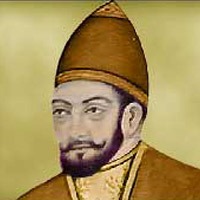Born to a Central Asia Turk family, Qutb-ud-din Aibak was captured and sold as a slave when he was a child. He was lucky to be purchased by the chief Qazi of Nishapur, who treated him like one of his own sons. Aibak received good education and was trained in the field of archery and horsemanship. However, when the master died, his sons, who were jealous of Aibak, sold him to a slave merchant. Fortune once again favored him and Muhammad Ghuri bought him.
Out of Ghuri’s thousands of slaves, Aibak, because of his character and qualities, became one of his master’s favorite. Aibak steadily rose through the ranks and eventually became a General. Like his owner Ghuri, Aibak performed his greatest deeds while still a subordinate. He was responsible for most of the conquests of Northern India and was appointed as Ghuri’s Viceroy to Delhi. When Ghuri died in 1206, the Turkish Amirs and Generals elected Aibak as the new Sultan. It was he who shifted the capital first from Ghazni to Lahore, and then from Lahore to Delhi, and thus is considered as the first Muslim ruler of South Asia.
Aibak could not rule for long and died in 1210 after falling from a horse while playing polo. He is buried near the Anarkali Bazaar in Lahore, where a new tomb was constructed over his grave around 1970. Though his tenure as a ruler was only four years, and most of them were spend in dealing with the revolts of nobles like Taj-ud-din Ildiz, Nasir-ud-din Qubachah and a few Hindu chiefs, yet he established a firm administrative system. He restored peace and prosperity in the area under him and roads were free from thieves and robbers. He started the construction of Quwaat-al-Islam Mosque at Delhi. He also laid the foundation of the Qutb Minar, which was completed by his successor Iltutmush. Aibak was known as Lakh Baksh because of his generosity. He was also a pious Muslim. Historians have praised his evenhanded justice. He patronized Nizami and Fakh-i-Mudabbir, both of whom dedicated their works to Aibak.
His successors, who ruled India till 1290, were also slaves like him and the dynasty is known as the Slave Dynasty.
This article was last updated on Sunday, June 01, 2003






